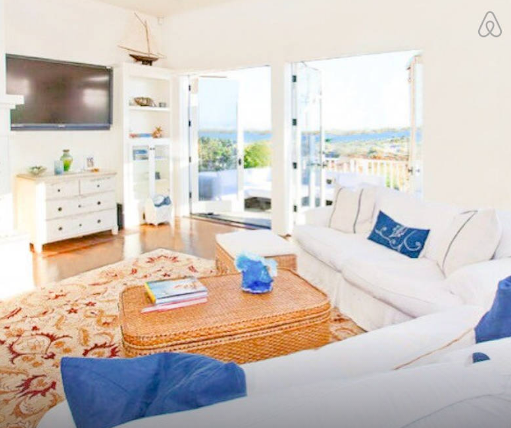8 ways to avoid getting scammed on your vacation rental this summer

At this point, stories about short-term rentals gone wrong are almost as common as roommate horror stories. Of course, they're more palatable if they're about someone else's ruined vacation, not your own. So how to avoid putting down money for a beach "mansion" that turns out to be more of a beach shack—or handing over your credit card info to a catfish-er? Below, expert tips on making sure a prospective rental is legit, so all you have to worry about is holiday traffic:
[Note: Updated on June 8, 2017.]
1. Pics or it doesn't happen
Just as you would during a regular apartment hunt (or on a dating site), disqualify listings that don't have pictures from your search. Ditto for ones with scenic photos of the beach or back yard, but few or none of the actual house or apartment. "Renting anything without pictures is bad news," says Hamptons-based Douglas Elliman agent Jordan Daniel. Consider this an easy way to whittle down your options.
2. Get personal
Most short-term listing sites have features that facilitate messaging or calling your hosts, and experts say you'd be well advised to take advantage of this. "Message the owner, ask them to send you more pictures of the house, or really anything to prove that it's a real house and they're not a robot," says Daniel, who also recommends this method for locking down smaller-scale logistics—for instance, whether or not there's a coffee-maker in the kitchen. Once things are farther along, call the owner to confirm the booking, recommends Jon Gray, CRO of HomeAway.
3. Consider the venue
Unsurprisingly, you're likely to be in safer hands with bigger listings sites like HomeAway and FlipKey than, say, Craigslist, Daniel points out. "There's no way of verifying the person actually owns the home on Craigslist," says Daniel, who notes that when renting out his own place on HomeAway, he was required to provide a good deal of paperwork to prove himself, including the actual deed to the house. It's comforting to think that your prospective host has had to do the same.
4. Investigate
Again, this part is similar to what you'd do during a typical apartment hunt. "Google the homeowner to get an idea of who they are as well as the property, if you have the address," says Gray. (You can also use Google Street View to give you a better idea of the neighborhood if you're looking to rent in an area you've never visited.) Even more importantly, pay close attention to a host's user reviews. "Obviously, if someone has stayed there before and liked it, it’s got to be at least somewhat legitimate," says Daniel. If you've got your heart set on a property listed by an untested host, Daniel recommends asking for a link to their social media profile to help verify (and scare off the imposters).
5. Get it in writing
"Get a rental contract signed by the owner before sending payment," recommends Gray. Simple, yes, but an effective way of protecting yourself—and sniffing out sketchy hosts who are hesitant to put your agreement down on paper.
6. Pick a safe payment method
In the world of short-term rentals—as in life—it's always wise to avoid wiring money to a complete stranger. Of all the vacation rental sites out there, Airbnb is actually the best on this front, with its own secure payment system that means money is handled through the site, and that you're never sending cash (or your credit card info) directly to the hosts. Other sites like HomeAway and VRBO also have safe payment systems (though not every host opts in), and it's best to seek these out whenever possible. If none of those options are available, Gray recommends using a credit card for payment, which is still safer than any kind of direct cash transfer or check. HomeAway's secure payments system offers free Echecks for renters to pay property owners through a secure system, Gray notes, and services like PayPal have similar systems in place to send checks with a certain amount of protection. "We always suggest using secure payments systems and avoiding checks and wire transfers," he adds.
7. Don't go off site
We've had experiences where hosts on Airbnb have suggested we consider other properties they manage that are not currently on the site. This is a red flag. Do it on your own and you won't have any of the protections awarded to you on these sites.
8. Go with your gut
Tempting though it is to book a last-minute getaway in a dreamy rental that just happens to be half of the price of everything else out there, hit pause and let cooler heads prevail. "Trust your gut instinct," advises Gray. "If the price is too good to be true then it probably is. A common scam from fraudsters is to undercharge and then ask for an expedited payment." If a host is rushing you or offering a luxe-looking home at bargain basement prices, beware.
You Might Also Like


























